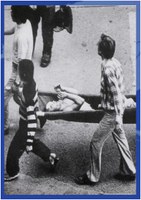The Issue
 The May 1980 Kwangju uprising was a significant turning point in the establishment of democracy in South Korea. However, the events and struggle of that time has received little attention both within the country and outside. There are many things that can be learnt from the citizens of Kwangju by the people of not only Asia, but also the world. One is the coming together of Kwangju city to fight for the values it believed in against the military, and later as a self functioning community. Another is the common conscience and morality of the community. And yet another is the perseverance and determination of the citizens to ensure that Kwangju is not forgotten.
The May 1980 Kwangju uprising was a significant turning point in the establishment of democracy in South Korea. However, the events and struggle of that time has received little attention both within the country and outside. There are many things that can be learnt from the citizens of Kwangju by the people of not only Asia, but also the world. One is the coming together of Kwangju city to fight for the values it believed in against the military, and later as a self functioning community. Another is the common conscience and morality of the community. And yet another is the perseverance and determination of the citizens to ensure that Kwangju is not forgotten.
There are many countries in Asia and elsewhere that have faced similar uprisings and military crackdowns. However, the response of Kwangju was a unique one, and for that reason it would be useful to see how civil society in these other countries can adapt the Kwangju experience to their own situations.
The Lessons
This is the first lesson in a two lesson series. There are two lessons in this first series, focusing on the particular events of the May 1980 uprising. (The second series will focus on the struggle of Kwangju from 1980 until the present).
Lesson 1: Discussion of the events of the May 1980 Kwangju uprising
Lesson 2: The role and actions played by civil society throughout this period